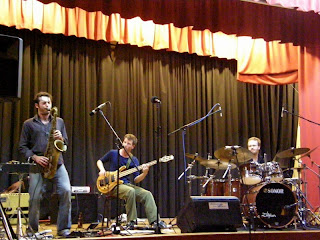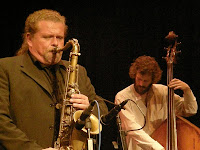 Trident+1 started the night. Trident are a trio comprising Chris Thwaite (drums), James Luke (bass) and Lachlan Coventry (guitar). The +1 is Ben Marston (trumpet, flugelhorn). James described the style as “made up on the spot, with some jazz standards to meet up … sometimes”. This is definitely the approach. It’s loose and improvised, but they have achieved this open and responsive relationship through playing together for considerable time. The experience shows. The set comprised 3 extended improvisations. There were soundscapes and funk and reggae and one hard swing. There were processed sounds galore. I guessed octavers, autowahs or synths, choruses, reverbs and echoes on trumpet, bass and guitar, and there may have been others. There were mesmeric repetitive rhythm passages, mostly set by guitar or bass. There were loads of solos from all instruments, variously standard jazz styles or more impressionistic. There were squeels of whales from flugelhorn, and didjeridoos emanating from bass. And there were lovely calls back to the jazz and even pop forms with melodies that rose from the highly processed, rhythmic substructure: Alone together followed by Nica’s dream over reggae; Madonna’s Material girl with a coda of Weather Report’s Birdland; Mingus’ Nostalgia in Times Square. The floor was littered with effects. There were two PAs on stage for the instruments alone, as well as the obligatory stage PA. It all sounded highly processed, compressed, full and fat, like recorded music rather than simple, acoustic jazz.
Trident+1 started the night. Trident are a trio comprising Chris Thwaite (drums), James Luke (bass) and Lachlan Coventry (guitar). The +1 is Ben Marston (trumpet, flugelhorn). James described the style as “made up on the spot, with some jazz standards to meet up … sometimes”. This is definitely the approach. It’s loose and improvised, but they have achieved this open and responsive relationship through playing together for considerable time. The experience shows. The set comprised 3 extended improvisations. There were soundscapes and funk and reggae and one hard swing. There were processed sounds galore. I guessed octavers, autowahs or synths, choruses, reverbs and echoes on trumpet, bass and guitar, and there may have been others. There were mesmeric repetitive rhythm passages, mostly set by guitar or bass. There were loads of solos from all instruments, variously standard jazz styles or more impressionistic. There were squeels of whales from flugelhorn, and didjeridoos emanating from bass. And there were lovely calls back to the jazz and even pop forms with melodies that rose from the highly processed, rhythmic substructure: Alone together followed by Nica’s dream over reggae; Madonna’s Material girl with a coda of Weather Report’s Birdland; Mingus’ Nostalgia in Times Square. The floor was littered with effects. There were two PAs on stage for the instruments alone, as well as the obligatory stage PA. It all sounded highly processed, compressed, full and fat, like recorded music rather than simple, acoustic jazz. Chris played fabulously in this format: richly changing rhythms; great counterpoint to more or less regular grooves of the other players; some excellent, accurate, clearly intentioned solos. James played a fretless 5-string Jazz bass, through masses of effects and into a PA for clear, sharp, full-range sounds. He played confidently, mimicked Zawinul-synths and didjerdoos and more, and played some lovely solos along with chords and harmonics at various other times. Lachlan was relatively traditional in this context: attractive and not overwhelming effects, and some crisp, clear jazz soloing. Ben set the scene with known melodies played with simplicity and conviction, but also dropped into impressionistic sounds and effected solos, and the first time I’ve heard octavered flugel. Great, confident and convincing playing all around.
Chris played fabulously in this format: richly changing rhythms; great counterpoint to more or less regular grooves of the other players; some excellent, accurate, clearly intentioned solos. James played a fretless 5-string Jazz bass, through masses of effects and into a PA for clear, sharp, full-range sounds. He played confidently, mimicked Zawinul-synths and didjerdoos and more, and played some lovely solos along with chords and harmonics at various other times. Lachlan was relatively traditional in this context: attractive and not overwhelming effects, and some crisp, clear jazz soloing. Ben set the scene with known melodies played with simplicity and conviction, but also dropped into impressionistic sounds and effected solos, and the first time I’ve heard octavered flugel. Great, confident and convincing playing all around.Trident+1 are a fabulously involving and developed outfit playing the highest level of groove-infected, culturally-inclusive music with a jazz sensibility. Trident play every Tuesday night at Trinity Bar in Dickson. Catch them!
 The second band was a less processed and took a more standard modern jazz approach, but still displayed frequent effects on sax and bass. And it also featured electric bass (another one to upset the conservatives). The band was the Matt Keegan Trio out of Sydney’s JazzGroove stable: Matt Keegan (tenor sax), Cameron Undy (electric bass) and Dave Goodman (drums). The trio played original music in the modern jazz idiom, with frequent blues or funk feels, and some monster unison lines.
The second band was a less processed and took a more standard modern jazz approach, but still displayed frequent effects on sax and bass. And it also featured electric bass (another one to upset the conservatives). The band was the Matt Keegan Trio out of Sydney’s JazzGroove stable: Matt Keegan (tenor sax), Cameron Undy (electric bass) and Dave Goodman (drums). The trio played original music in the modern jazz idiom, with frequent blues or funk feels, and some monster unison lines. Matt mostly plays a considered, calm and melodic style with clear intentions and a considerable exploration of dissonance. On the other hand, he loosened up and played excitedly on the later tunes on the night, and also played with a range of effects on various tunes throughout the night. Cameron is a frequent visitor to Canberra, being a product of the town and the Jazz school. He plays with a strangely wooden tone on a 5-string electric bass: more woody than crystal clear; very satisfying on fast funky patterns and occasional blistering solos. I found it interesting to hear the way Cameron dug into the strings with strong double bass-strengthened fingers. It made for a very different and more traditional sound than James’ in Trident (although James also plays double bass). I was also interested to notice how much a statement of the underlying rhythm was Cameron’s soloistic style. It’s not unusual in bassists; I noticed a similar approach by Zoe Hauptman. Dave played a strong, steady and definitive role in this band along with a busy, satisfying solo later in the night. The band lifted for the last few tunes, when Cameron rose from his seat, and the energy level was turned up a notch. So, a strong and competent modern jazz outfit.
Matt mostly plays a considered, calm and melodic style with clear intentions and a considerable exploration of dissonance. On the other hand, he loosened up and played excitedly on the later tunes on the night, and also played with a range of effects on various tunes throughout the night. Cameron is a frequent visitor to Canberra, being a product of the town and the Jazz school. He plays with a strangely wooden tone on a 5-string electric bass: more woody than crystal clear; very satisfying on fast funky patterns and occasional blistering solos. I found it interesting to hear the way Cameron dug into the strings with strong double bass-strengthened fingers. It made for a very different and more traditional sound than James’ in Trident (although James also plays double bass). I was also interested to notice how much a statement of the underlying rhythm was Cameron’s soloistic style. It’s not unusual in bassists; I noticed a similar approach by Zoe Hauptman. Dave played a strong, steady and definitive role in this band along with a busy, satisfying solo later in the night. The band lifted for the last few tunes, when Cameron rose from his seat, and the energy level was turned up a notch. So, a strong and competent modern jazz outfit.





